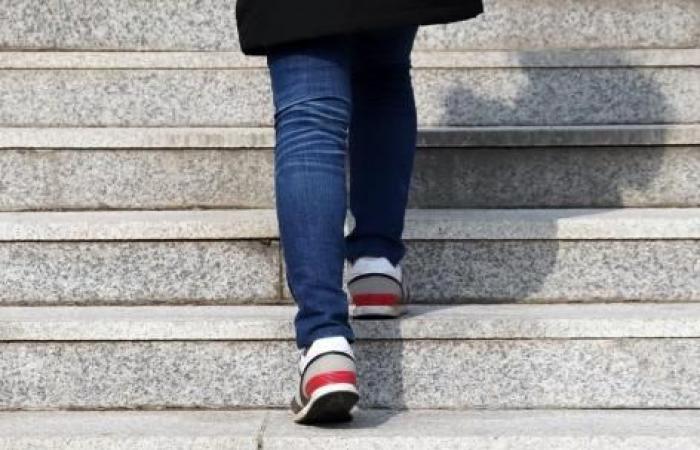THE ESSENTIAL
- Five minutes of exercise a day could reduce blood pressure, according to a study of more than 14,000 volunteers.
- It must be an activity that increases the heart rate quickly, such as climbing stairs, chasing the bus or cycling.
- Replacing sedentary behaviors with 20 to 27 minutes of exercise per day is also beneficial.
No need to become a marathon runner to lower your blood pressure, just prefer the stairs to the elevators. Here are, in essence, the conclusions of the joint work of the University of Sydney and University College London (UCL).
Their study, published in the journal Circulation on November 6, 2024, shows that just five extra minutes of activity per day – the equivalent of climbing stairs – helps reduce blood pressure.
Heart: climbing stairs helps reduce blood pressure
For their experiment, the researchers gave a device measuring activity and blood pressure to more than 14,000 volunteers from 5 countries (United Kingdom, Australia, Netherlands, Finland, Denmark). They had to wear it day and night. During analyses, observed daily activity was divided into six categories: sleep, sedentary behavior (such as sitting), slow walking, brisk walking, standing, and finally more vigorous exercises such as running, cycling, or walking. climbing stairs.
Data analysis showed that doing an extra five minutes a day of activities that raise the heart rate – such as climbing stairs – helps reduce blood pressure. In addition, replacing sedentary behavior with 20 to 27 minutes of daily exercise (cycling, running, etc.) could reduce cardiovascular diseases by up to 28%, according to the team’s estimates.
“The finding that doing as little as five minutes of extra exercise per day could be associated with lower measurable blood pressure readings highlights how powerful short bursts of higher-intensity movement could be for the management of blood pressure”explains co-lead author Professor Emmanuel Stamatakis in a press release.
High blood pressure: focus on activities that increase heart rate
1.28 billion adults worldwide suffer from hypertension (hypertension). This abnormal increase in blood pressure increases the risk of stroke, heart attacks, heart failure, kidney damage and many other health problems. To fight against this disease, scientists recommend, based on their results, favoring short, intense activities to lower blood pressure rather than long, less physically demanding activities such as walking.
“The good news is that regardless of your physical ability, it doesn’t take long to have a positive effect on blood pressure. What’s unique about our exercise variable is that it includes all exercise-type activities, such as running to catch the bus or going for a short bike ride, many of which can be incorporated into the daily routine”explains first author Dr Jo Blodgett.
“For those who don’t exercise a lot, walking still has positive effects on blood pressure. But if you want to change your blood pressure, it is by increasing the cardiovascular system through exercise that you will achieve the greatest effect”reassures the expert.






